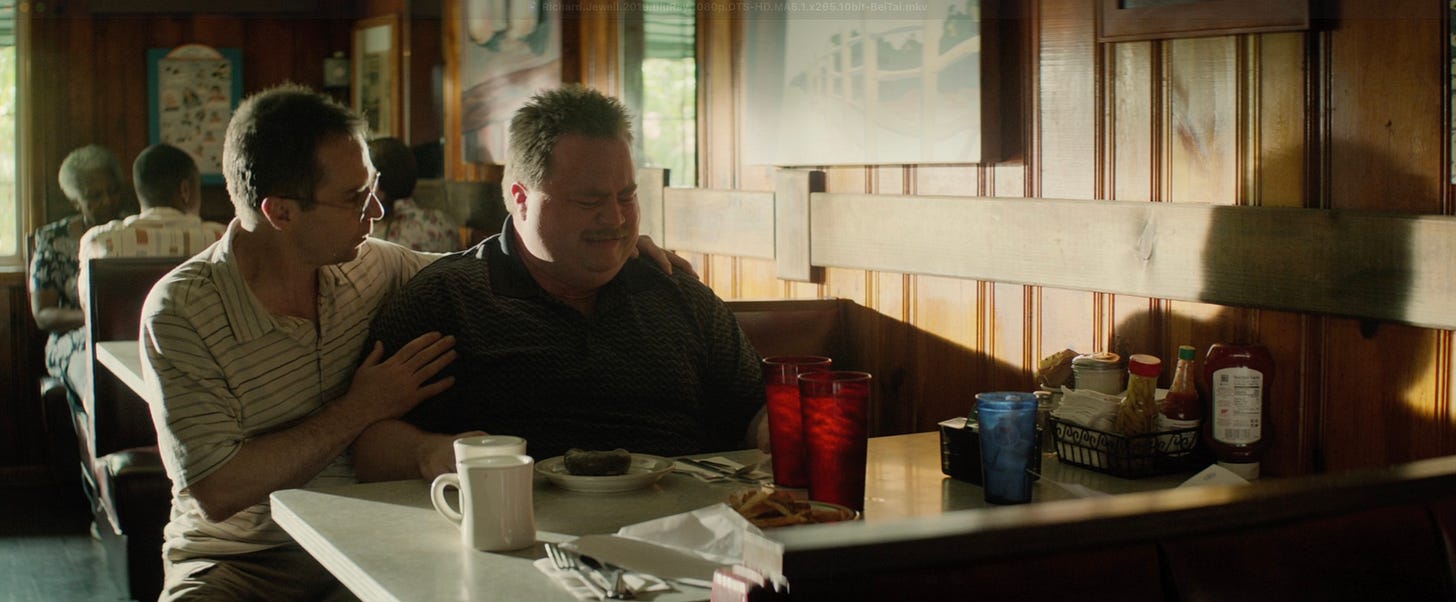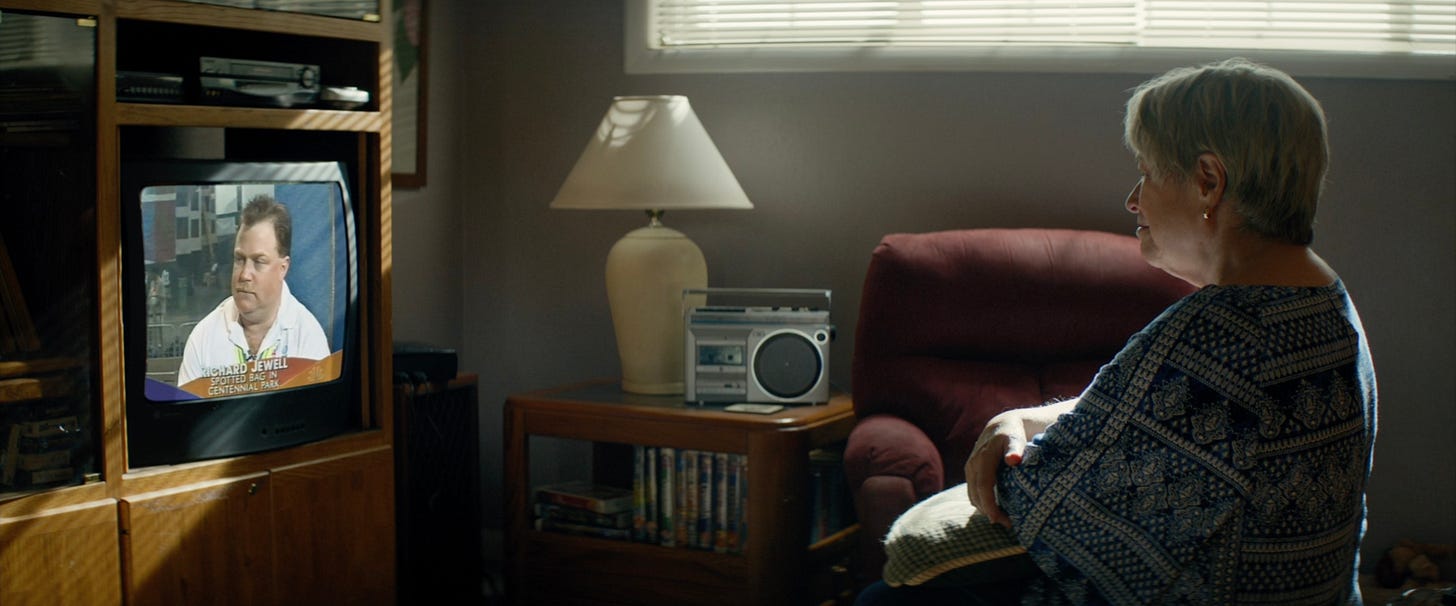Late Eastwood #8: Richard Jewell
A few words about a good man
Welcome to Late Eastwood, my tour through the late work of the still very much alive Clint Eastwood. This is a journey through the prolific director’s films since 2010, a period of his career with which I’m almost wholly unfamiliar. With his new film, Juror #2, on the horizon, I will be combing though the films leading up to it, so I can learn a bit more about what motivates a 94-year-old to keep practicing his art. These posts are usually for paid subscribers only, but for a limited time, I’m making this one free. If you like it, do hit subscribe.
I haven’t talked much about screenwriting in this Late Eastwood series. My focus, of course, is on a director who doesn’t write his own films, so that accounts for part of it. Truthfully, though, it’s because the scripts, for the most part, aren’t anything to write home about. Sully has settled in my mind as one of the great films of last decade, but you wouldn’t catch me praising its writing particularly. It’s servicable, which is enough for a filmmaker like Eastwood, whose work is defined much more by his stylistic approach to whatever material is in front of him, revealing a wonderfully eccentric and often trenchant perspective. His is a cinema of people onscreen in spaces exisiting in the world, the mechanics of plot and dialogue are not the primary concern. Of course, it’s not like better writing would hurt, and Richard Jewell is great proof.
Billy Ray is not a name you see bandied about too much in conversations about Hollywood’s great modern screenwriters. He’s something of a journeyman, but in my opinion a cut above when the opportunity arises. Shattered Glass, which he also directed, is among the best dramas of the ‘00s, and if he only ever did that, it’d be enough. This is the guy who started his career by writing the Bruce Willis/Jane March erotic thriller Color of Night, and he clearly became a go-to Hollywood script polisher, writing on films like Volcano and Flightplan and Gemini Man. There’s also The Hunger Games. And his Oscar-nominated screenplay for Captain Phillips. I’m not some Billy Ray auterist, but he’s a very good writer, especially of dialogue. He’s also got a keen eye for using marginal details to build character. Take, for example, the crush Richard Jewell’s mom Bobi, played by Kathy Bates, has on Tom Brokaw. “Why did Tom Brokaw say that about you?” she asks her son, when the news anchor reports on the FBI’s investigation into him. It’s a funny line, and the conciet is quirky, but it’s also a detail that bring Bobi’s character to life beyond Bates’s stellar performance or Eastwood’s sympathetic rendering. It’s why so many scenes involving her brought me to tears.
I knew from its opening scenes that I was going to love Richard Jewell, but it was when Richard, having saved lives at the Centennial Park bombing during the Atlanta Olympics, appears on TV for an interview with Katie Couric that I understood the movie was operating at another level entirely. Throughout those early scenes, which begin in the ‘80s, with Richard working as a supply clerk at a government office, and lead all the way to that heroic moment, we come to know the characters well. Richard, a desparately sweet man who wants nothing more than to be a law enforcement officer and protect people. His mother, who he still lives with, and with whom he shares a beautiful sort of co-dependency. Watson Bryant, the attorney played by Sam Rockwell, whose rebellious streak has led him to financial difficulty, but who recognizes the great quality of Richard’s kindness, which includes offering him Snickers bars when he notices the lawyer’s stash is low. When Richard gets a job at a sherrif’s department, Watson tells him, “A little power can turn a person into a monster, Richard. Don’t do that, you understand?” Richard is naive, but that naivety, that fundamental goodness, is worth preserving.
That Couric interview, though. After all his striving, and all his moderately buffoonish dream to be a serious law enforement officer, Richard’s too intense vigilence actually works. He saves people. And then he goes on TV, and like a good hero, he claims no heroics, pointing instead to all the other people who helped. Not unlike Captain Sully. Watson is at his office watching the interview, and Richard’s mother is too, at home, and and with the way Eastwood shoots it—so simple but impressionistic—I couldn’t help bursting into tears. And then, of course, it all comes crashing down.
Here is where I’ll address one real knock against the film. That is, the depiction of real-life Atlanta Journal-Constitution reporter Kathy Scruggs. From the accounts I’ve read, Olivia Wilde’s overheated performance—too much in the context of this film, certainly, a result of Eastwood’s hands-off approach to actors—is nonetheless quite accurate to Scruggs’s actual personality. Short skirts and all. What there is no evidence for is that Scruggs ever traded sex for favours from sources. The decision to have her character in the film do that is, indeed, the kind of needless character assassination she had done to Richard in her reporting on the FBI investigation. Two wrongs don’t make a right, especially when Scruggs, who died in 2001, cannot respond. It’s a stain on the film. A minor one in my opinion, but real, unfortunately for the film the controversy it created overshadowed everything else.
Richard Jewell is a film about a hero, but like all of Eastwood’s hero movies, it’s really a film about what it means to be a good person in the world. In this case, it’s a world so cynical that it would cast the hero as the villain. The bombing sequence is itself terrific. A long, carefully choreographed set-piece that proves even in his advanced age, Eastwood really has the stuff, that nuts-and-bolts sense for how to make something exciting. What comes after is the crushing weight of reality, and both Ray and Eastwood lean right into the seedy absurdity of what happens to Richard. The FBI begins looking into this guy, who fits many of the hallmarks of a wannabe cop who orchestrates an incident to appear the hero. Not an unheard of situation, but the fact that the Bureau locks onto that theory, without an ounce of actual evidence, is a perfect expression of the cynical use of power Watson warned Richard against. Get the vulturous press involved and a moment of pride becomes a living nightmare for Richard and his mother. Their home bombarded by media, torn apart by FBI evidence collectors, they’re left in isolation, only their lawyer and a few friends there to lean on. And all the while, Richard remains deferential to the FBI, to authority, because he believes in authority, he trusts it.
In the film’s second half, much of the drama revolves around Watson’s attempts to get Richard to understand what’s really happening to him and start fighting against it. “This kid's getting railroaded. We're gonna help this guy. We're gonna help this guy. This kid's getting railroaded,” Watson tells his partner, after doing the math and realizing the evidence clearly shows Richard couldn’t have been behind the bombing. What plays out is something like a comic farce, in which Richard can’t help but try to assist the FBI agents investigating him. The farce gives way to moments of devastation. Late in the film, Bobi can’t take the pressure anymore, turning on the TV in the middle of a coversation about the case, and Richard yells at her. She runs off into the bathroom and he coaxes her out. She emerges in tears, and Richard is choked up, too. It’s one thing for these figures of authority to ruin his life, but ruining his mothers is a bridge too far. This is the hinge point. It’s also another scene that made me cry.
I cried when Richard, in all his torment, imagines himself crawling over the backpack with the pipe bombs to take the brunt of the explosion. I cried again when Bobi speaks at a press conference defending her son. I cried when Richard finally stands up for himself in his interview with the FBI. I cried before that, when Watson tells him, “Nobody in that room is a better man than you.” I cried when Richard breaks down at the news that he’s officially no longer a target of the investigation, tears streaming down his face as he bites into a doughnut. I cried when Bobi’s tupperware is returned, with writing scrawled on it by the FBI evidence team. I cried when, six years later, Richard is working again at a sherrif’s department and Watson stops by to inform him the real bomber was finally caught.
There, through all the tears, making the whole thing hang together, is Paul Walter Hauser as Richard. There are many great performances in the film, and Bates was rightly nominated for an Oscar, but Hauser is just amazing. It’s a character that could so easily have been a caricature—I wonder how Jonah Hill would have played him in the earlier iteration, which would have co-starred Leonardo DiCaprio—and Hauser doesn’t shy away from the comedy inherent. But he never plays Richard as stupid. A little oafish maybe, but he’s a man who’s always aware that others view him that way. He can’t change who is is, though, and he doesn’t want to. So he suffers. The derision, the mockery, all of it, until he can’t take it anymore. And even then, when he does sit down for the interview with Jon Hamm’s slimy FBI agent, Hauser zeroes in on what makes this character work. As the agent asks his questions, prodding Richard to somehow slip, everything the audience needs to know is happening in Hauser’s eyes. When Richard finally pushes back, calling out the fact that the FBI plainly has no evidence against him, Hauser finds a middleground between Richard’s natural deference and Watson’s open defiance. He allows every facade to drop and makes Richard’s appeal both sharply intelligent and startingly human. A good man.










